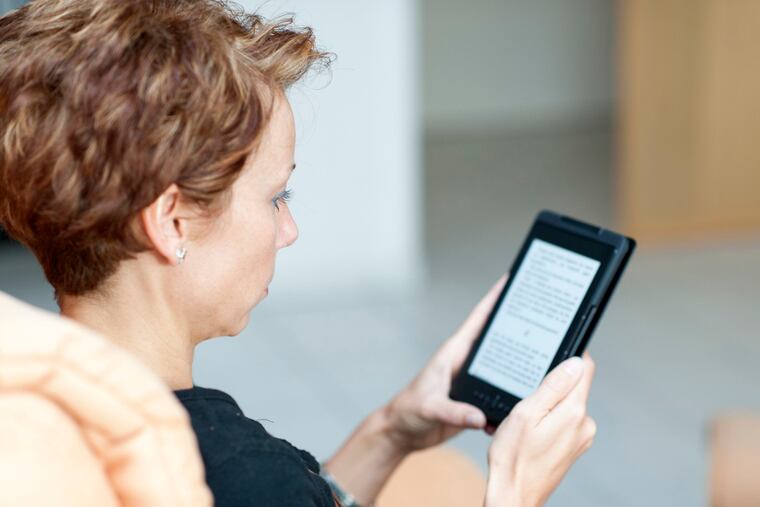Tired of waiting for e-books? Two national digital library systems might help. | Opinion
Two national digital library systems supported by an endowment might answer skyrocketing interest in e-books and online resources.

In Philadelphia and elsewhere, you may wait weeks for your favorite bestseller in e-book format. One day last January, more than 1,500 Philadelphians were digitally lined up for the e-book version of Michelle Obama’s memoir, Becoming.
And the mess may get worse if other publishing companies imitate the library-hostile policies of the giant Macmillan Publishers, which lets a library buy just one e-book copy during the first eight weeks of publication.
The $1.6 billion that U.S. public libraries spend a year on books, along with other paper and electronic items, won’t do. That amount shakes out to just about $5 per American — less than what a Big Mac with medium french fries and a soft drink would cost in Philadelphia.
Might one remedy be two well-stocked national digital library systems partly supported by a national library endowment, funded by interested members of the super-rich? A public system would serve public and K-12 libraries and their users. An academic equivalent would be for college students, professors, researchers. This vision needs to be on librarians’ minds as the American Library Association meets in Philadelphia for its Jan. 24-28 conference.
Currently, libraries lack the leverage with publishers to give taxpayers the most e-books for their money. In addition, libraries must cope with unreasonable restrictions. Macmillan Publishers, for example, recently imposed a one-copy limit on e-books for libraries for the first eight weeks of publication.
The two digital systems would offer libraries more bang for their buck in another way. Today, America’s public libraries can spend only about 13% of their budgets on books and other content, in part due to costs such as checkouts and shelving of print books. Those activities require humans, whose salaries must be paid. And there are other expenses, such as the costs of library buildings.
The two digital systems wouldn’t replace all paper books and brick-and-mortar libraries — just reduce the cost of expanding the number of titles available.
Doubt there’s a growing demand? OverDrive, the largest library e-book provider, reported this month that public and school library patrons have checked out 326 million of its e-books, audiobooks, and digital magazines “in the past 12 months, a 20% increase over the previous year.”
Links for the national system’s digital books could appear within local library and academic sites, with librarians choosing which titles they wanted most prominently displayed.
At the same time, the endowment and librarians could give away free paper books for children from low-income families to own. Groups like First Book and Dolly Parton‘s Imagination Library have blazed the way.
In the e-book and audiobook areas, the recent purchase of OverDrive by a profit-crazed investment company makes it more urgent than ever for libraries to consider the twin digital systems. OverDrive-style corporations could excel as contractors for the two systems, but only librarians can be trusted to look out for the public interest in areas such as user privacy and digital preservation.
» READ MORE: What were the most popular ebook downloads at the Free Library of Philadelphia in 2018?
Another reason for the two systems is that academic freedom at universities would suffer if a universal digital system had to deal with local- and state-level censorship in communities more inclined to control what their citizens can read. Look at a new censorship proposal out of Missouri. Outrageously, librarians could be jailed for letting minors read books that citizen panels deemed harmful to children.
The two digital systems could work out joint purchasing arrangements and share people and other resources to avoid wasteful repetition. A universal digital catalog could let sophisticated users simultaneously search the academic and public systems. In addition, academic and public libraries could collaborate on an authoritative reference service reachable 24/7, day or night, a godsend for students with homework, even though the national service would augment, not replace, local reference.
Funds for the two digital systems could come not only from the endowment, but also fees paid by local, state, and academic libraries and others. Special breaks could exist for cash-strapped communities and schools.
A $20 billion library endowment within five years would be realistic. Harvard’s endowment alone is worth some $40 billion. Such an endowment approach would best meet libraries’ ongoing needs, especially in an era of databases and other content with subscription models.
How to start? The endowment, the two digital systems, and its other possible activities could be a major focus at widely publicized conferences attended by librarians, prospective benefactors, academics, and other stakeholders. Here’s an invitation to ALA, philanthropists, and others to get the ball rolling.
Corilee Christou is a former public, academic, and K-12 librarian. She was a vice president at Reed Business Information when it owned Library Journal, School Library Journal, and Publishers Weekly. David H. Rothman is a cofounder of LibraryEndowment.org and the editor-publisher of TeleRead.org. davidrothman@pobox.com